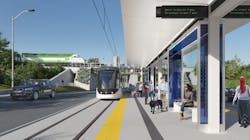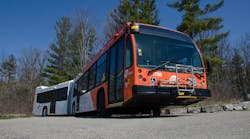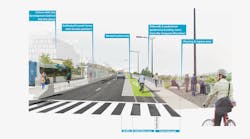Mississauga City Council endorses six transit priority projects
Six bus rapid transit (BRT), rail and transit hub projects have been identified by the City Council of Mississauga, ON, as priority projects. The city council endorsed the six projects at its Sept. 15 meeting.
“Our goal is to get Mississauga moving and to give people an option other than the car. The priority transit projects we have identified will connect our communities from the Airport Corporate Centre to our downtown core to the city’s waterfront and to our neighbors to the east and west,” said Mississauga Mayor Bonnie Crombie. “These rapid transit lines will spur growth and development in our city, create jobs and service essential businesses, and allow us to achieve our goal of building complete, healthy communities where people can live, work and play. The job of building a great city is a shared responsibility, which is why we are calling on the federal and provincial levels of government to work together to build these critical projects.”
The six priority projects identified include:
- Lakeshore BRT (and additional transit improvements along Lakeshore corridor), which will run along two kilometers (1.24 miles) along Lakeshore Road from the Etobicoke Creek to East Avenue.
- Dundas Bus Rapid Transit, which will extend BRT along Dundas Street for 48 kilometers (29.8 miles) to create fast, frequent and reliable transit between Greater Toronto and the Hamilton Region.
- Downtown Mississauga Terminal and Transitway Connection, which will connect the existing Mississauga Transitway along Rathburn Road/Centre View Drive through the city’s downtown core, with a terminal that serves both MiWay and GO Transit. When complete, the terminal will serve four modes of transit.
- Extension of the Eglinton Crosstown West (ECWE) Light Rail Transit, which will include seven stops along 9.2 kilometers (5.7 miles) of mostly underground track.
- Milton GO Rail Corridor, where increased two-way all-day service will help respond to growing traffic congestion, meet the demand for inter-regional transit service and support economic development.
- Hurontario LRT Downtown LRT Loop, which is a three-stop Mississauga city center loop that was removed from the planned 18-kilometer (11.2-mile) north-south rail connection between Mississauga and Brampton in 2019 due to budget pressure.
“With our transit priorities identified, we can focus on our financial planning and readiness should programs, resources or funding become available from other levels of government,” said Mississaugua Commissioner of Corporate Services and Chief Financial Officer Shari Lichterman. “Understanding, identifying and confirming our transit-related priorities allows us the insight we need when reviewing our capital budget where there are many competing priorities and limited municipal resources to fund them.”
Mayor Crombie added, “Transit is part of our Mississauga Matters campaign as we look for senior levels of government to make significant investments in our local and regional transit systems – such as all-day two-way service on Mississauga’s GO transit lines, restoring the downtown LRT loop and rapid transit along the Dundas corridor – to allow us to break gridlock and congestion and get people and businesses moving.”
As programs develop for transit initiatives, funding requests will be included through the city’s Business Plan and Capital Budget process and presented to the council for consideration.
“Transit is an important component of our Transportation Master Plan that helps shape Mississauga’s transportation system. We are being strategic, moving forward with the right projects for growing a multi-modal transportation system that offers safe and efficient ways to move around the city and connect with other destinations,” said Geoff Wright, commissioner, Transportation and Works.

Mischa Wanek-Libman | Group Editorial Director
Mischa Wanek-Libman is director of communications with Transdev North America. She has more than 20 years of experience working in the transportation industry covering construction projects, engineering challenges, transit and rail operations and best practices.
Wanek-Libman has held top editorial positions at freight rail and public transportation business-to-business publications including as editor-in-chief and editorial director of Mass Transit from 2018-2024. She has been recognized for editorial excellence through her individual work, as well as for collaborative content.
She is an active member of the American Public Transportation Association's Marketing and Communications Committee and served 14 years as a Board Observer on the National Railroad Construction and Maintenance Association (NRC) Board of Directors.
She is a graduate of Drake University in Des Moines, Iowa, where she earned a Bachelor of Arts degree in Journalism and Mass Communication.





